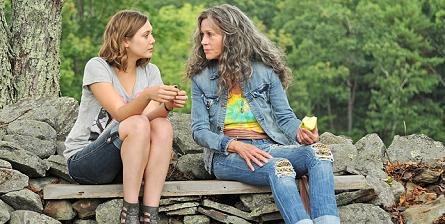Paolo here again to discuss three new films.

Peace Love and Misunderstanding
Bruce Beresford's new film begins with a table full of stuffy bourgeois lawyers taking down Pulitzer-winning playwrights. They seem like the kind of people the audience would like to become when they're older, having real opinions about theatre and the other high arts. This party takes place despite the Reaganite hostess, Diane Hudson (Catherine Keener) considering a divorcing from her husband (Kyle McLachlan). She takes her kids Zoe (Elizabeth Olsen) and 'documentarian' Jake (Nat Wolff) to the legendary Woodstock, New York to see their hippie grandmother (Jane Fonda). Fonda's character's presence thus questions one's notion of adulthood, as she is older yet free as the grandmother we wish we had.
Divorce and the other conflicts pop up one after another only to be resolved, a tricky comic tone to maintain. This light freedom is also evident in one scene when a chicken practically blocks our view of a character adding to the chaotic yet natural energy in this home and town. Every member of the household gets to hook up, Diane with a local musician (Jeffrey Dean Morgan), vegetarian Zoe's surprise match with a butcher named Cole (Chace Crawford) and Jake with a barista.
 Fonda was the master of modern American elocution and we still hear that when she fires off the script's great one liners. But even Fonda can't help when her character turns into a Kristen Wiig caricature. Chace Crawford, capably evokes the heavy air that comes with a young man who has grown up in a rural area. And since I might not get to catch Martha Marcy May Marlene at the festival, watching Olsen's supporting work here is a decent consolation prize. She performs Zoe just as intelligent and emotionally sound as the script suggests.
Fonda was the master of modern American elocution and we still hear that when she fires off the script's great one liners. But even Fonda can't help when her character turns into a Kristen Wiig caricature. Chace Crawford, capably evokes the heavy air that comes with a young man who has grown up in a rural area. And since I might not get to catch Martha Marcy May Marlene at the festival, watching Olsen's supporting work here is a decent consolation prize. She performs Zoe just as intelligent and emotionally sound as the script suggests.
Butter
This comedy about the world of butter sculpture competition in Iowa centers around Laura Pickler (Jennifer Garner), a sculptor's wife who takes on her husband Bob's (Ty Burrell) job after he is forced into retirement. Quirk topic with the strangest case of a joke bombing in a movie... (more on Butter and the documentary Dark Girls with Viola Davis after the jump.)
 Jennifer Garner Learning A Marketable Skill: Butter Sculpting.
Jennifer Garner Learning A Marketable Skill: Butter Sculpting.
The story somehow involves a stripper and joke contestant named Brooke (Olivia Wilde) who tells Laura's husband, a customer, a rape joke. Nobody in the screening room laughed. I might be projecting here, but subjects like that are uncomfortable enough in dramas but mentioning it in a comedy is a real tightrope walk. Olivia Wilde, though, playing a role that's too young for Elizabeth Banks and too old for Megan Fox, grabs this character by the throat with some sharp and smooth delivery, adding both slapstick and heart to the role, the film's necessary components.
Despite that off note rape joke, the film has a lot of laughs, many seemingly coming from comedic improvisation. One particularly funny scene involves a ten year old contestant named Destiny (Yara Shahidi) and her adopted father Mr. Emmett (Rob Corddry). Destiny has low self esteem as a girl who's made her rounds in the Iowa foster system, and she becomes hesitant to enter the building to sign up for the competition. Her father reassures her by asking her what's the worst that could happen and they proceed to make up random supernatural worst events that could happen there. It's beautiful to listen as Shahidi plays this game with a Daily Show alum while speaking like Marcel the shell. I also hope that I'm not the only one seeing star potential in this young actress.

DARK GIRLS
Actor/documentarian Bill Duke's Dark Girls is about colourism, slightly different from racism, where one's skin tone is the subject of prejudice and judgment. The film gathers interview subjects of all races, skin tones, genders and levels of education who discuss several related topics: how slavery has affected the perception of beauty concerning black women, the idolatry of lightness, fetishization of blackness, and how people rationalize their discriminatory mind sets through 'opinion' and 'experience' Some of the 'dark skinned' women share stories about the kinds of people who verbally make their prejudices known, to surprising results.
Though the documentary aspires to be comprehensive about the perception about darker skinned women there are blemishes in the presentation. Specifically, there's Duke showing the effects of beaching products and the economic scheme around the perpetuation of lightness and exclusion of dark tones in the media's female representation. I don't mine seeing skin flaking when these women stop using bleaching creams, but when an interview subject talks about money, don't show money; images don't have to be literal or spoon-fed.
 But the soul of this film are the dark skinned women of every age purging their experiences when others look down on them and deny their beauty. One of these subjects is two time Tony winner Viola Davis, who revealed that kids both white and black made fun of her and used racial slurs.
But the soul of this film are the dark skinned women of every age purging their experiences when others look down on them and deny their beauty. One of these subjects is two time Tony winner Viola Davis, who revealed that kids both white and black made fun of her and used racial slurs.
Now, this probably won't help this mature woman, but if anyone wants to join a gang called 'Beating Up Viola Davis' Bullies,' you can sign up right here!